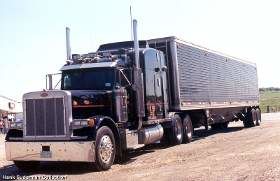Women Truckers And Personal Safety
Topic 14072 | Page 1

How will I know if an area is unsafe, especially if I've never been there before? Are there things to look for?
Yes. Below are some ways you can judge the safety of a particular area. Remember that no guide is a replacement for common sense. Listen to your instincts. If you feel particularly unsafe in an area (no matter the reason), do not park there. Always give yourself time to find alternative parking, especially when you're new.
•People panhandling, selling items, or otherwise knocking on truck doors and approaching people
•Lots of foot traffic at night in the surrounding area
•Prevalent graffiti or other vandalism, especially broken glass in the lot which is evidence of vehicle break-ins
•People loitering around the entrance to the building
•Dilapidated or burned down buildings in the area
•Stray or feral dogs and cats
•Areas that are very poorly lit
Remember that these qualities do not necessarily make an area unsafe, but they should be taken into consideration when making the decision to park. Sometimes you will have no choice but to park in a less than desirable area. If this is the case, there are steps you can take to protect yourself.
What can I do to increase my safety in my truck while I sleep?
•Always lock your doors. Confirm this before you retire for the night.
•If you have a set of front curtains that cover the windshield and side windows, draw them.
•Do not leave anything of value (or that looks valuable) in view.
•Get a small decal that proclaims "I Love My German Shepherd" or something to that effect and adhere it to your window at night, even if you do not have a dog.
What can I do to increase my safety when walking at night?
•Carry a flashlight and try to take the most direct route possible.
•Buy a whistle or a "Screaming Meanie" alarm and carry it with you to draw attention to yourself if needed.
•If you must have a self defense weapon, buy a wooden tire thumper at any truck stop. They are practical, require no training, legal in every state and most have a metal core that makes them very formidable.
•Carry your phone and call someone (or pretend to call someone) while you walk.
•Buy a heavy men's coat several sizes too large and wear it when walking (when reasonable).
I hope this post helps some of you. Remember that this country is not as dangerous as the media would have you believe. Crime rates are lower now than they were in the 70's. Most likely you will never encounter a truly dangerous situation while on the road. Most drivers are good people and will be quick to render aid should you ever need it. If you have any questions or need clarification on something, feel free to ask. Stay safe out there!

Great post, thank you!

Great post, thank you!
Thanks! I'm actually planning on doing a few posts like this, to address the topics that come up the most on the Ladies forum.

I really like that you said, these same things apply to men. Or something along those lines. I honestly don't think there are any special concerns for female truckers. All truckers deal with the same dangers and the same problems. The biggest differences between us have more to do with what type of equipment we use, what we haul, and where we haul to, not what gender the trucker is. :)
HOS:
Hours Of Service
HOS refers to the logbook hours of service regulations.
I really like that you said, these same things apply to men. Or something along those lines. I honestly don't think there are any special concerns for female truckers. All truckers deal with the same dangers and the same problems. The biggest differences between us have more to do with what type of equipment we use, what we haul, and where we haul to, not what gender the trucker is. :)
I agree 100%. Most crimes targeting truckers (few though they are) involve robbery, burglary or hijacking and are usually in no way related to gender. Even then, the dangerous situations we face everyday stem simply from driving the truck, not violent crime. Drivers are much more likely to be seriously injured or killed in an accident than anything else.
HOS:
Hours Of Service
HOS refers to the logbook hours of service regulations.New Reply:
New! Check out our help videos for a better understanding of our forum features

















Preview:








 TT On Facebook
TT On Facebook
One thing that comes up a lot in this subforum is personal safety. If you're new to the industry, you probably have many questions related to safety. So I've written this post in order to give a concise guide to the most common questions I see raised about this topic. And although this post is directed at women, many (if not all) of the things herein apply to men, too. So whether you're just getting your permit or are getting the keys to your own truck, read on to learn all about safety and hopefully assuage some of your fears.
What are truck stops like? Are they safe?
You will be going to many truck stops during your driving career. This is where you will get fuel and DEF for the truck, take a shower, and (sometimes) take your 10-hour break. They usually have hot food and sundries available for purchase inside, most have showers, and some have laundry facilities. Truck stops will sometimes be dirty from other drivers throwing trash on the ground instead of the garbage can, and most will smell of urine, especially in the hot summer months. These things do not make a truck stop unsafe. The vast majority of truck stops are safe with a few exceptions. Those located in certain urban areas are more likely to be unsafe. Read on to find out more about how to identify truck stops that are riskier than others.
What about rest areas?
Rest areas are located on major highways and contain anywhere from a few parking spots to a few hundred. If you've ever been on a road trip you've probably used one. They usually have separate parking areas for cars and trucks/trailers, although some do not allow any trucks and some do not allow any cars. Most have a building located in the center of the parking areas that contains restrooms and water fountains. Some rest areas have vending machines, free wireless internet, road maps and tourist brochures, on site security guards and cameras, and even fast food stands. Some rest areas do not have restrooms at all and will usually be called "picnic areas" or "parking areas". Most rest areas, like truck stops, are quite safe. They are usually located some distance from towns and cities and as a result do not have the issues that truck stops in urban areas sometimes have. However, they are sometimes less well lit and have very few people coming and going at all hours of the night compared to the amount that truck stops do.
Is there anywhere else safe I can park?
Yes. There are alternatives to parking at truck stops or rest areas, including Walmarts and other large retail stores, grocery stores, home improvement stores, malls, movie theaters, restaurants, hotels, and your company's terminals. You will utilize many of these at some point during your career, either out of necessity (there is nowhere else to park close to shipper/receiver) or because you want to buy groceries, watch a movie, etc. Some shipper/receivers will allow you to park there before or after your appointment, though it's best not to rely on this unless you have confirmed it in advance with the customer. In the case of private businesses, always call and ask if truck parking is allowed. Do not leave trash behind or otherwise give these places reason not to allow truck parking in the future. It's also polite to purchase something, although not necessary. Are these safe places to park? Most are, but some aren't. It depends upon a variety of factors. Read below to get some tips for determining if an area is safe to park.
Shipper:
The customer who is shipping the freight. This is where the driver will pick up a load and then deliver it to the receiver or consignee.
Terminal:
A facility where trucking companies operate out of, or their "home base" if you will. A lot of major companies have multiple terminals around the country which usually consist of the main office building, a drop lot for trailers, and sometimes a repair shop and wash facilities.
HOS:
Hours Of Service
HOS refers to the logbook hours of service regulations.OWI:
Operating While Intoxicated